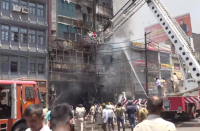Members of the Tokyo Metro bowed their heads for a minute of silence on Friday (March 20) in remembrance of the sarin poison gas attack on the the city’s subway system which killed 13 and sickened more than 6000 twenty years ago.
At an altar at the Kasumigaseki station offices, Prime Minister Shinzo Abe turned up with white lilies to pray for those that died and those that continue to suffer the lingering effects of the nerve gas sarin.
“I have just offered my sincerest condolences to those who died, to their families and to those that still suffer the after effects (of the gas) on this day 20 years (since the attack). We will do our utmost to ensure that that this sort of incident never happens again,” Abe told reporters.
Sarin, first developed by the Nazis, was let go early during the morning rush hour on March 20, 1995, by followers of the religious cult Aum.
The incident, which came with images of bodies lying across platforms and soldiers in gas masks sealing off Tokyo subway stations, stunned the Japanese public, accustomed to crime-free streets.
The cult behind the attack was set up in 1987 by its leader Shoko Asahara – whose real name is Chizuo Matsumoto. It mixed Buddhist and Hindu meditation with apocalyptic teachings to attract, at its peak, at least 10,000 members in Japan and overseas, among them graduates of some of the nation’s elite universities.
Aum, which in 1999 admitted involvement in the subway gassing, changed its name in 2000 to Aleph, the first letter of the Hebrew alphabet. Its leaders say it poses no threat now but the Japanese authorities disagree and keep its membership of about 1,600 under surveillance.
Many of the victims that survived and the families of those killed still vividly remember that day 20 years ago.
Shizue Takahashi, the representative of the Association of the Victims of the Subway SarinAttack, arrived to pray for Kazumasa, the husband she lost in 1995. He was one of the many station staff who died after trying to remove the bags of sarin they had found without knowing what it was.
Takahashi said the sarin memorial should come as a reminder to all that safety should not be taken for granted whether inside or outside Japan.
“This is not only about Japan. Even outside Japan there is the danger of terrorism. So no-one can say they’ll never be victim of these kind of incidents. I want everyone to be constantly aware of these dangers,” she said.
“My husband died in this very place… so it feels I have come back to see him,” she said.
Takahashi said she returns every year to the the station at the center of the attack to commemorate those who died and remember the husband she lost.
Reuters/ TV TOKYO







